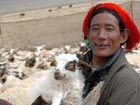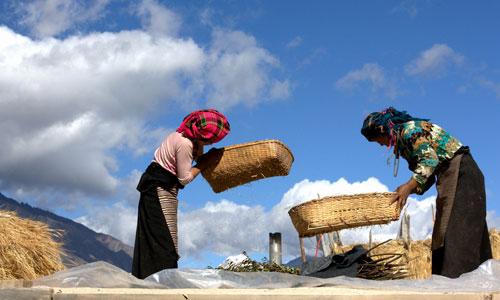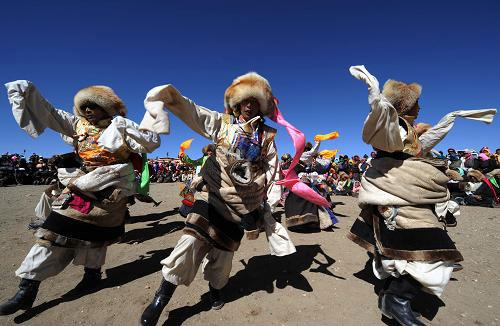| Videos | ? Latest |
|
? Feature | ? Sports | ? Your Videos |
Preferential policies boost sustainable growth in Tibet

 0 Comment(s)
0 Comment(s) Print
Print E-mail
CNTV, July 18, 2011
E-mail
CNTV, July 18, 2011
Excessive livestock grazing in Tibet has caused grassland degradation. Preferential policies have been introduced by the central government, to ensure a balance between sustainable development and demand for livestock business.
The adoption of a sustainable method for raising livestock has been a must in Nakchu county, central Tibet, after years of overgrazing under poor natural conditions.
Luoya, a longtime herdsmen is considering selling 65 sheep this year. The 74-year-old has spent his whole life raising livestock. However, in recent decades, due to the excessive increase of the number of livestock, the overloaded pasture has become fragile. Like many other herdsmen, Luoya is considering reducing the number of livestock he owns, which is his major source of income.
Therefore, a preferential policy was issued in May this year by the central government. It says if herdsmen can reduce the number of excessive livestock based on the grazing capacity, they can receive subsidiaries. Luoya took the lead in the village for this initiative, and has reduced the number of his sheep by over 400.
Luoya, Herdsman, said, "The policy is great, the pasture is our life. Although the number of livestock has dropped, the pasture has become the best ever, it's thicker and more dense. Livestock can also be sold at a higher price. "
Rewards are used by herdsmen to buy home appliances. Local governments even distribute cooking stoves to them.
Herdsmen are encouraged to adopt wood for boiling, instead of cow dung, which should be left on the pasture as fertilizer.
|
Excessive livestock grazing in Tibet has caused grassland degradation. Preferential policies have been introduced by the central government, to ensure a balance between sustainable development and demand for livestock business. |
"We didn't have the right to manage our pasture under serfdom. Now that we can make a living with it, we'll protect it."
The new policy not only ensures the flourishing of the pasture, it also brings new opportunities for young people. Trultsa is one of them. He uses government rewards to buy necessary facilities for running businesses.
Trultsa, Local Resident, said, "I want to buy vehicles, and other tools to create a modern livestock industry, and get rich with other villagers."
She plans to open a store, and make a change to herdsmen's traditional and monotonous lifestyle.
Wancha, Director, Zaring Town, said, "It was hard to accept the policy at the beginning. We gave lots of explanations, and people have now begun to understand the true meaning behind the policy. They are willing to cooperate. They're beginning to realize that if the grassland can be protected well, the livestock quality will be better."
Tibetan people used to acclimate themselves to natural conditions passively and exploit the natural resources excessively. They chopped up plants for fuel, leading to sandstorms in spring and winter.
Ecological protection in Tibet has been put on the central government's agenda after the peaceful emancipation of Tibet sis decades ago. And improving the grassland is giving local herdsmen a better future with more possibilities to explore ways to prosperity.







